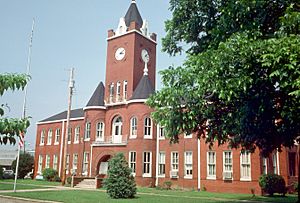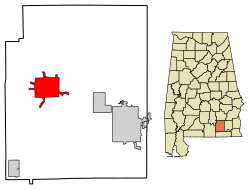Elba, Alabama facts for kids
Quick facts for kids
Elba
|
|||
|---|---|---|---|

Coffee County Courthouse in Elba
|
|||
|
|||
| Nickname(s):
The City of Flowing Wells
|
|||

Location of Elba in Coffee County, Alabama.
|
|||
| Country | United States | ||
| State | Alabama | ||
| County | Coffee | ||
| Settled | Early 1830s | ||
| Incorporated | April 13, 1853 | ||
| Government | |||
| • Type | City Council/Mayor | ||
| Area | |||
| • Total | 15.42 sq mi (39.93 km2) | ||
| • Land | 15.34 sq mi (39.73 km2) | ||
| • Water | 0.08 sq mi (0.21 km2) | ||
| Elevation | 194 ft (59 m) | ||
| Population
(2020)
|
|||
| • Total | 3,508 | ||
| • Density | 228.71/sq mi (88.31/km2) | ||
| Time zone | UTC-6 (Central (CST)) | ||
| • Summer (DST) | UTC-5 (CDT) | ||
| ZIP code |
36323
|
||
| Area code(s) | 334 | ||
| FIPS code | 01-23296 | ||
| GNIS feature ID | 0117908 | ||
Elba is a city in Coffee County, Alabama, United States. It is the main county seat, which means it's where the county government offices are located. Coffee County actually has two courthouses, with the other one in Enterprise. In 2020, about 3,508 people lived in Elba. It is part of the larger Enterprise area.
Contents
History of Elba
Early Settlement and Naming
The town of Elba started in the early 1830s near a ferry crossing on the Pea River. It was first called Bridgeville. A post office opened there by 1841. In 1851, people held a lottery to pick a new name for the town. One person had been reading about Napoleon Bonaparte and suggested "Elba". This name was chosen from a hat, and that's how the town got its unique name! Elba became the county seat of Coffee County in 1852.
Railroads and Industry
A logging railroad first reached Elba in 1892. A permanent rail line arrived in 1898. This new railroad helped a company called "Dorsey Trailer Company" grow. They made trailers for trucks that could also be carried on trains. This was important for moving goods across the country. The railroad stopped serving Elba in 1984.
The Pea River and Floods
The Pea River is a very important part of Elba's history. The Creek Indians used to call it the Talakatchee River. In their language, talak means "pea" and hatchee means "small river".
The Pea River often flooded, causing a lot of damage to the town. The "Lincoln flood" in 1865 was the first to badly damage Elba. Another huge flood happened in 1929. The river rose to over 43 feet! Airplanes had to drop supplies to the town because it was completely underwater. Only one person, an African-American man named "Phoe" Larkins, died in this flood. A baby born during the flood was named "Noah Tucker" after the biblical story of Noah.
After the 1929 flood, a levee (a wall to hold back water) was built around the town in 1930. They also added flood gates and improved drainage. However, floods still happened, especially big ones in 1938, 1959, and 1975. The worst flood ever recorded in Elba was in 1990. The river reached 48 feet, and the levee broke. Elba was completely flooded for four days and was almost destroyed. More floods hit the town in 1994 and 1998.
Geography of Elba
Elba is located in the western part of Coffee County at 31°25′2″N 86°4′39″W / 31.41722°N 86.07750°W.
Roads and Waterways
U.S. Route 84 goes around the north side of the city. It leads east about 9 miles (14 km) to New Brockton and southwest about 16 miles (26 km) to Opp. Several state highways also pass through Elba. These include Alabama State Routes 87, 125, 189, and 203.
According to the U.S. Census Bureau, Elba covers about 15.4 square miles (39.9 square kilometers). Most of this area is land, with a small part being water. Elba is right next to the Pea River.
Elba's Climate
Elba has a humid subtropical climate. This means it has hot, humid summers and winters that are usually mild to cool.
| Climate data for Elba, 1991–2020 simulated normals (190 ft elevation) | |||||||||||||
|---|---|---|---|---|---|---|---|---|---|---|---|---|---|
| Month | Jan | Feb | Mar | Apr | May | Jun | Jul | Aug | Sep | Oct | Nov | Dec | Year |
| Mean daily maximum °F (°C) | 60.6 (15.9) |
64.6 (18.1) |
71.8 (22.1) |
78.4 (25.8) |
85.6 (29.8) |
90.3 (32.4) |
91.9 (33.3) |
91.4 (33.0) |
88.0 (31.1) |
80.1 (26.7) |
70.2 (21.2) |
63.0 (17.2) |
78.0 (25.5) |
| Daily mean °F (°C) | 48.7 (9.3) |
52.2 (11.2) |
59.0 (15.0) |
65.7 (18.7) |
73.4 (23.0) |
79.5 (26.4) |
81.9 (27.7) |
81.3 (27.4) |
75.4 (24.1) |
67.3 (19.6) |
57.0 (13.9) |
51.3 (10.7) |
66.1 (18.9) |
| Mean daily minimum °F (°C) | 36.7 (2.6) |
39.9 (4.4) |
46.4 (8.0) |
52.9 (11.6) |
61.0 (16.1) |
68.9 (20.5) |
71.8 (22.1) |
71.2 (21.8) |
66.4 (19.1) |
54.7 (12.6) |
43.9 (6.6) |
39.6 (4.2) |
54.5 (12.5) |
| Average precipitation inches (mm) | 5.35 (135.80) |
4.91 (124.68) |
5.23 (132.88) |
4.83 (122.78) |
3.79 (96.16) |
5.55 (140.89) |
6.58 (167.10) |
5.49 (139.57) |
6.57 (166.77) |
3.47 (88.24) |
4.04 (102.61) |
5.21 (132.43) |
61.02 (1,549.91) |
| Average dew point °F (°C) | 39.2 (4.0) |
42.1 (5.6) |
46.9 (8.3) |
53.6 (12.0) |
61.3 (16.3) |
68.5 (20.3) |
71.8 (22.1) |
71.6 (22.0) |
67.1 (19.5) |
56.5 (13.6) |
47.1 (8.4) |
42.6 (5.9) |
55.7 (13.2) |
| Source: PRISM Climate Group | |||||||||||||
Elba's Population
| Historical population | |||
|---|---|---|---|
| Census | Pop. | %± | |
| 1880 | 222 | — | |
| 1890 | 285 | 28.4% | |
| 1900 | 635 | 122.8% | |
| 1910 | 1,079 | 69.9% | |
| 1920 | 1,681 | 55.8% | |
| 1930 | 2,523 | 50.1% | |
| 1940 | 2,363 | −6.3% | |
| 1950 | 2,936 | 24.2% | |
| 1960 | 4,321 | 47.2% | |
| 1970 | 4,634 | 7.2% | |
| 1980 | 4,355 | −6.0% | |
| 1990 | 4,011 | −7.9% | |
| 2000 | 4,185 | 4.3% | |
| 2010 | 3,940 | −5.9% | |
| 2020 | 3,508 | −11.0% | |
| U.S. Decennial Census 2013 Estimate |
|||
Population in 2020
In 2020, the 2020 United States census counted 3,508 people living in Elba. There were 1,427 households and 917 families.
| Race | Num. | Perc. |
|---|---|---|
| White (non-Hispanic) | 1,994 | 56.84% |
| Black or African American (non-Hispanic) | 1,270 | 36.2% |
| Native American | 23 | 0.66% |
| Asian | 2 | 0.06% |
| Other/Mixed | 145 | 4.13% |
| Hispanic or Latino | 74 | 2.11% |
Population in 2010
The census in 2010 showed 3,940 people living in Elba. The city had about 257 people per square mile. There were 1,547 households. About 25% of households had children under 18. About 39.9% were married couples.
The population was spread out by age. About 22% were under 18. About 19.6% were 65 or older. The average age was 40.9 years.
Education
Elba has its own public school district. There are two schools in the city:
- Elba High School (for grades 7 through 12)
- Elba Elementary School (for grades K through 6)
Media
Elba has one local radio station:
- WZTZ 101.1 FM (which plays sports)
Notable People from Elba
Many interesting people have come from Elba, including:
- Robert D. Bullard, known as the "Father of Environmental Justice."
- Alpheus Ellis, a banker and generous person from Florida.
- James E. "Big Jim" Folsom, the only person from Coffee County to become governor of Alabama.
- Troy King, who was Alabama's Attorney General from 2004 to 2011.
- Ronald McKinnon, a player in the National Football League.
- Cornelia Ellis Wallace, who was the First Lady of Alabama from 1971 to 1978.
See also
 In Spanish: Elba (Alabama) para niños
In Spanish: Elba (Alabama) para niños
 | Emma Amos |
 | Edward Mitchell Bannister |
 | Larry D. Alexander |
 | Ernie Barnes |



